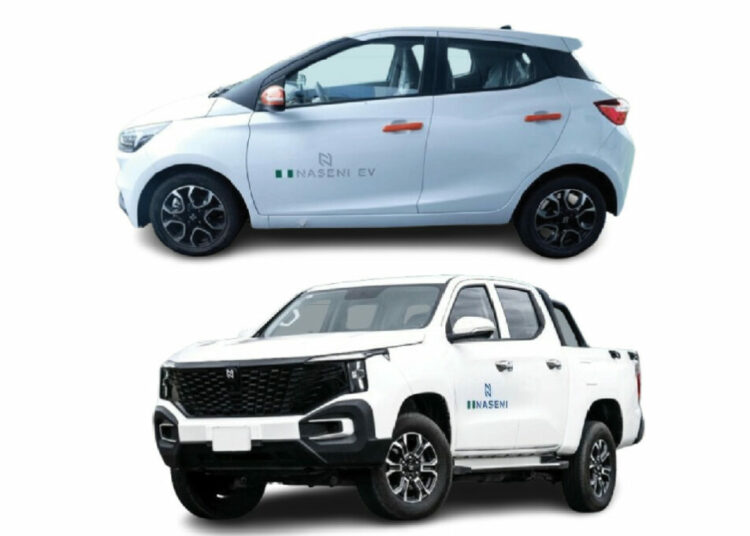The National Agency for Science and Engineering Infrastructure (NASENI) is working at putting Nigeria in the map of countries that have embarked on the manufacturing of the all-important zero-emission electric vehicles (EVs) that is revolutionizing the transport sector.
The advent of electric vehicle technology propelled global transition to sustainable and cost-effective transportation away from fossil fuel. NASENI under the foresight of its Executive Vice Chairman (ECV/CEO) Khalil Suleiman Halilu, has been pushing for Nigeria to massively benefit from the sector.
When NASENI took the significant step to launch Nigeria’s first electric vehicles, Nigerians instantly started seeing a new initiative that will eliminate carbon emission, which has the potential to improve air quality, especially in congested urban areas.
This leads to public health benefits for drivers and passengers alike. Drivers will also significantly reduce their running costs by using electric-powered vehicles instead of gasoline as electric-powered vehicles appear to be quieter than gasoline-powered vehicles, reducing noise pollution in cities.
This initiative aligns with the Agency’s mandate of developing indigenous technology solutions, more importantly, the renewable energy solutions, supporting industrialization, economic well- being, job creation and progress.
Nigeria, through NASENI’s electric vehicle system is bringing numerous milestone achievements in adopting the electric vehicle technology, which has significant impact in mitigating climate change and creating a healthy environment for Nigerian citizens. NASENI’s electric vehicles are poised to revolutionize the transportation sector by providing a cleaner, more efficient and sustainable alternative energy.
Electric vehicles is the product of human inventions that has come to take over from the internal combustion engines and Nigeria, through NASENI, is placing itself strategically as an emerging global centre to invest in this technology for the benefit of humanity. Since the emergence of this technology, it has been a constant effort to improve as more electric vehicles make it to the global markets.
For instance in 2023 alone, over 14 million EVs were sold globally, according to the International Energy Agency (IEA). There is no doubt that China manufactured and sold more electric vehicles than most countries because the Chinese auto policy has received enormous support from the Chinese government currently led by Xi Jingpin. The Europeans are not left out as they have made significant investments in the sector and trailed the Chinese while the United States follows suit.
This changing dynamics has led to a projection that by 2030, which is just five years away, six out of every ten new cars sold will be electric. This transformation is predicated on variables such as stricter environmental regulations, reduction in the global price for lithium batteries and investment in new technological innovations.
In Nigeria, and other parts of Africa, electric vehicles are best suited to address the challenges facing the country and regions in general. Since the policy of the fuel subsidy removal by the Nigerian government, Nigerians are paying more for fuel as a liter cost between N800 and N900 depending on location. By all standards this is very high and it is taking a heavy toll on people’s pockets.
This crisis is compounded by the uncertainty in the international oil market that is replete with price disruptions in the supply chain, due to unpredictable nature of geopolitics of oil production that in most cases do not favour Nigeria because of its fragile economic position in the global arena.
Therefore, NASENI was apt in demonstrating capacity to bring the electric vehicle alternative to Nigerians, which will save costs. Electric vehicles may be more expensive to purchase, but they are significantly cheaper to run. Charging an electric vehicle reportedly costs a fraction of what it takes to fuel a petrol or diesel car.
With a population of nearly 223 million, Nigeria should be the natural hub for automobiles in Africa. Records from the National Bureau of Statistics (NBS) said that more than 14 million vehicles ply Nigerian roads, with majority running on petrol. The consumption of fuel per litre in Nigeria is put between 64 and 66 million per day.
This humongous number weakens the nation’s economic base. This crisis is compounded by the fact that in 2022, Nigeria reportedly spent $23 billion on the importation of petroleum products. This is unsustainable and the EVs remain a viable alternative.
NASENI has taken the gauntlet, and with its collaboration with partners both local and international, the production of electric vehicles of different types has become the game changer. For instance, NASENI’s electric tricycle (Keke) will redefine commercial transportation in the country as it has zero-emission and makes less noise than the gasoline-powered keke.
Under the current leadership in NASENI, the Agency has mapped out strategies to establish electric vehicle plants to meet the demands of millions of Nigerians. Although, there are few companies doing electric vehicle assembly in Nigeria, NASENI’s intervention will certainly bring the price down.
Most importantly, the NASENI electric vehicle plants will blend well with its Renewable Energy Park owned by the Agency, under construction in Gora in Nasarawa state. The renewable energy park will be manufacturing items such as lithium batteries, the very important resource that is used to facilitate electric vehicles.
By aligning electric vehicle production with renewable energy development, NASENI intends to establish an ecosystem that uses clean energy to power clean transport in order to reduce dependence on fossil fuels, improve energy security, and place Nigeria firmly within the global clean technology comity.
The global innovation climate in electric vehicle is the energy Nigeria needs to power its industrial base in this sector. This energy needs to be sustained by NASENI and partners as Nigeria stands to benefit immensely from the investments that will reshape its mobility landscape in years to come.
As the NASENI EVC has once declared, “Infinite Possibilities await Nigeria’s smart mobility sector. Africa must not be left behind. While our purchasing power today is low-to-moderate and rising urban demand signals a huge market opportunity”, this must be followed by a streamlined policy to harness the potential in this sector.
The prospect for massive jobs resulting from investment in electric vehicle manufacturing is high, economic development and the prestige of industrial power house that will accrue to Nigeria will be an opportunity so enticing to embrace.
NASENI is at the forefront in this campaign to reset Nigeria’s industrial drive through the manufacturing of electric vehicles and the EVC/CEO is calling on African countries to key into this arena and tap from the bountiful opportunities. With over 14 million EVs sold globally in 2023, it is expected that by 2030, electric vehicles will make up 60 per cent of all new car sales.





